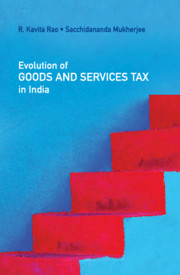Book contents
- Frontmatter
- Contents
- List of Figures
- List of Tables
- Acknowledgements
- List of Abbreviations
- Introduction
- Part I Genesis and Evolution of GST in India
- Part II Revenue Neutrality of GST
- Part III GST Administration and Possible Impacts of GST on Indian Economy
- Conclusion: Impact of GST and What Might Happen
- Index
Introduction
Published online by Cambridge University Press: 26 April 2019
- Frontmatter
- Contents
- List of Figures
- List of Tables
- Acknowledgements
- List of Abbreviations
- Introduction
- Part I Genesis and Evolution of GST in India
- Part II Revenue Neutrality of GST
- Part III GST Administration and Possible Impacts of GST on Indian Economy
- Conclusion: Impact of GST and What Might Happen
- Index
Summary
The objective of this book is to provide a comprehensive overview of the journey towards introduction of the goods and services tax (GST) in India. The book is based on research carried out at the National Institute of Public Finance and Policy (NIPFP), New Delhi, spanning over a decade. The basic objective of the volume is to highlight the contributions of the chapters in shaping the design and structure of the GST as well as capturing the evolution of the concept of GST in India since the late 1980s. The Indian GST is unique for its structure, design and administrative framework. The country-specific experience discussed in the chapters will help the readers to familiarise themselves with the alternative arrangements available with reference to design, structure and administration of GST from the perspective of a federal country. The concept of GST evolved over time in India and successive tax reform committees played an important role in shaping the Indian indirect tax system that finally culminated in the introduction of GST. Designing a destination-based dual value-added tax (VAT) system for a federal country like India was a challenge and from this perspective the Indian GST is unique. In this volume an attempt is made to capture the historical journey of policy research that was initiated since the inception of the government's interest in a national-level GST for India in the union budget speech of 2006–07. The introductory chapter of the book summarises the recommendations of successive tax reforms committees, constituted since Independence, with specific reference to the indirect tax regime. The recommendations contributed to a clear focus on the removal of the cascading of taxes (building up of taxes) and transition to a destination-based GST regime in India. This volume covers tax reforms carried out both in central and state indirect taxes during the last four decades and provides a background for the introduction of GST.
The chapters were written at different points in time spanning a decade and contributed to the then-ongoing discussion on GST. Each chapter of the book is based on rigorous theoretical as well as empirical research. In many countries, GST has been a tax levied by the national government.
- Type
- Chapter
- Information
- Evolution of Goods and Services Tax in India , pp. 1 - 4Publisher: Cambridge University PressPrint publication year: 2019



